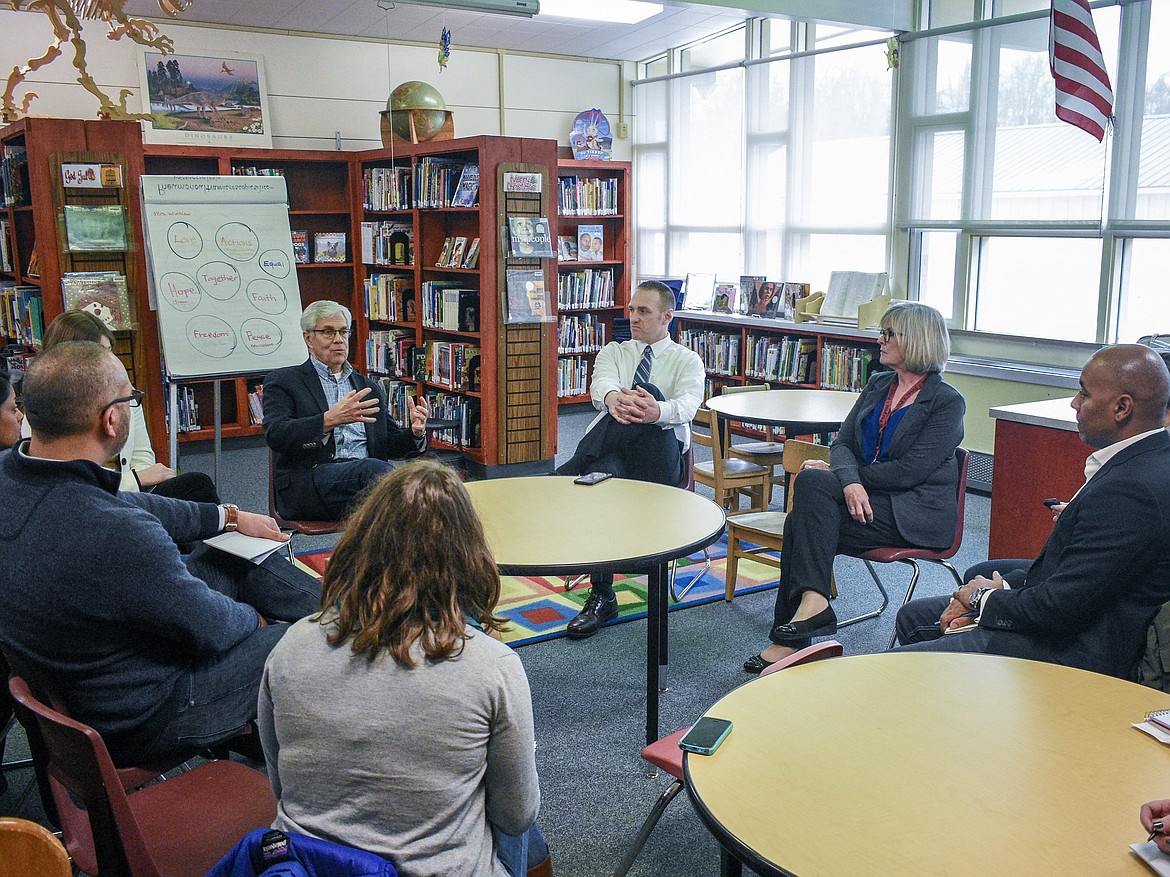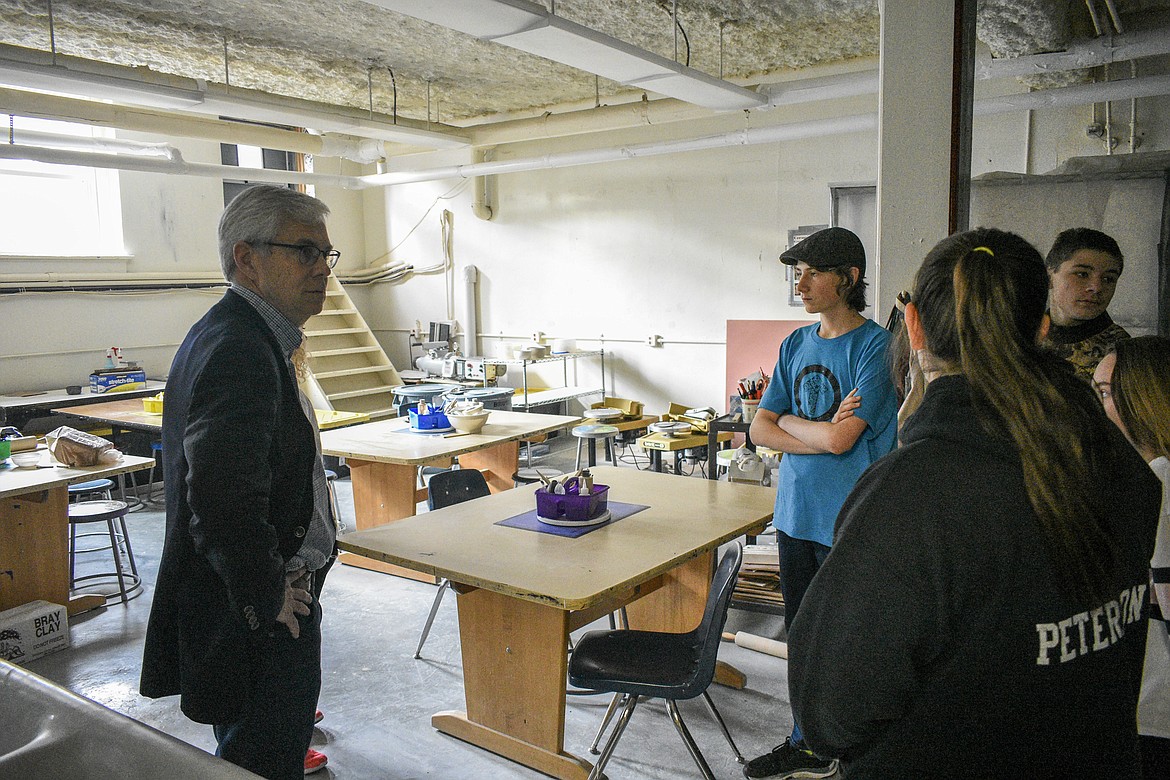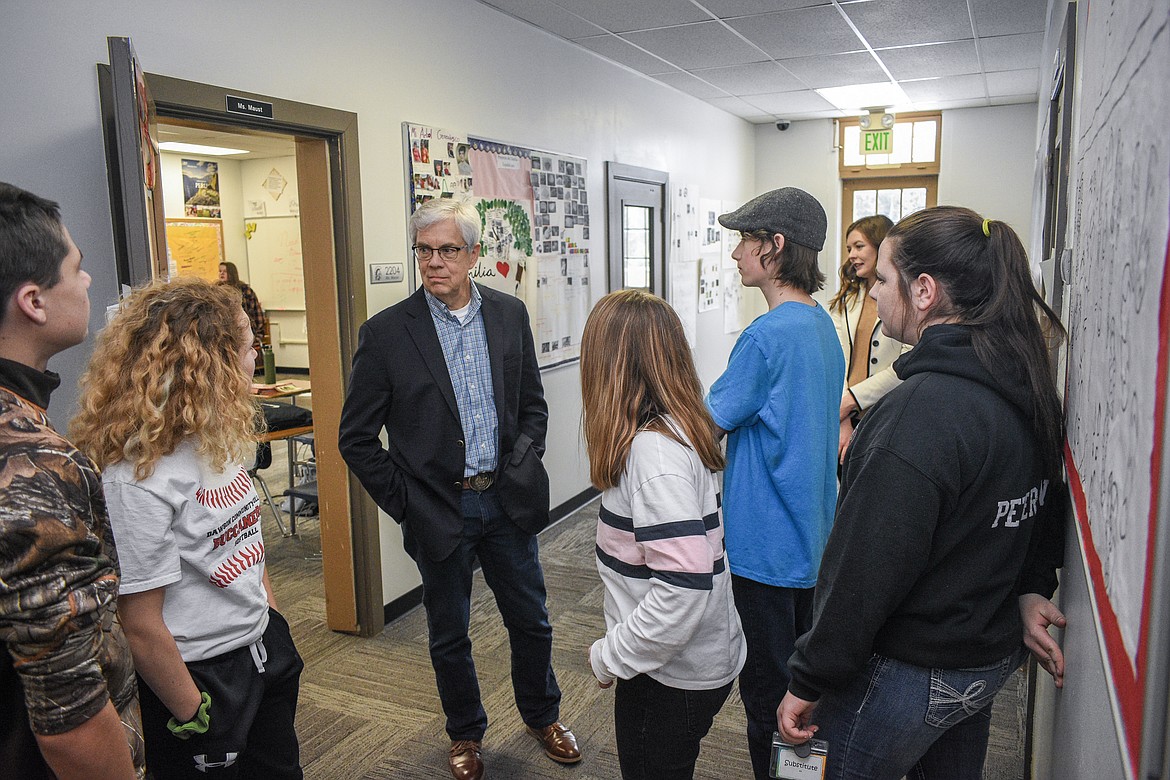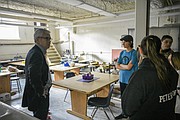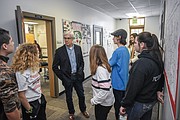Lt. Governor sees example for community in school's success
Montana Lt. Governor Mike Cooney visited Troy’s schools Jan. 30 along with representatives of consulting firm Deloitte Services LP, as part of the evaluation phase for Internet needs and capabilities in Troy.
Deloitte is currently studying the Internet situation and needs in Troy in order to create a “road map,” Cooney said during a meeting with Troy Public Schools Superintendent/W.F. Morrison Principal Jacob Francom and W.F. Morrison Principal Diane Rewerts.
“We’re not here to tell you we’re here to save you, and we’ve got all the answers. But, we’re here to help you and try to bring together the resources so the community can make some progress towards putting together a plan for the future of Troy,” Cooney said.
Cooney asked if there were barriers the school faces due to Internet connection problems.
Rewerts responded that the students have access to good Internet at school. The problem is when students go home.
“At home, a lot of our kids just don’t have the opportunity to have Internet access,” she said.
For students in seventh-to-twelfth grade who take school-issued Chromebooks home with them, they are able to do some work without an Internet connection, and then the Chromebook uploads the work when they connect to the Internet, Francom said.
There are also hotspots that operate off of cellphone networks that the students can check out of the school library, Rewerts said.
Those hot spots are configured to limit the types of content students can access through them, as well as restricted hours they can be used in order to prevent students from using them late into a school night.
But, Troy has students who come from as far as the Yaak, and many of them don’t live in areas that even have cellphone service, Francom said. There is satellite Internet service, but price and reliability become issues.
Additionally, Rewerts said that there are some programs — such as for math -- that the students could have added benefit from if they could access them from home.
Francom pointed out that improved connectivity further out into the community has the potential to help the local economy as well.
While discussing the potential for people to set up home-based businesses or telecommute, Rewerts -- who lives in the Bull Lake area -- said that she has Internet there, but there are problems with trying to get work done over it.
While doing distance learning, she had to either get things done before 4 a.m. or after 10 p.m., when not many people were on. Otherwise, the connection was too slow for her to be able to watch videos or even download materials.
Cooney pointed out that, even for people who don’t need good connectivity, for many people in the modern world connectivity is just a part of daily life. Lack of it could discourage people from moving to the area.
Deloitte Senior Manager Jason Miller, in regard to his input during the meeting, said that there is an important cultural aspect to the Internet in the modern world.
“Broadband can provide access to pop culture, but also exposure to what is going on in the world -- creating exposure to what is possible for students in Troy and creating excitement for what is available for life opportunities,” he said.
At school
Francom said that the school has 500 megs of bandwidth on the campuses of W.F. Morrison and the Middle-High School. That represents a recent upgrade from 200-meg service.
The upgrade was done by Frontier Communications, which owns the fiber optic line that comes into Troy. Francom said he was both surprised and pleased to find out that the school would actually have to pay $500 less for Internet after the upgrade in service.
“We have nothing to complain about as far as our bandwidth -- and the cost,” he said.
The school has access points that are managed by a third party, but the underlying infrastructure comes through Frontier, he said.
Deloitte Managing Director Charles Neal said during and after the meeting that he felt Francom and Rewerts may have been modest in describing all they have accomplished at the school.
“The school is doing a fantastic job equalizing the playing field for students,” he said by email. Especially in a community where poverty is an issue, that can have important ramifications for whether children will make their way out of that generational cycle.
Elsewhere in the community, the team has encountered people who seem to have no hope things can be improved on, he said.
“What is impressive about what the school leaders have done, is that you all took a very strong, proactive step, and said, ‘Well, this is not sufficient for our students. We can do better,’” he said.
Miller asked Francom and Rewerts if there was anything the community at large could learn from what the school has done.
“Write grants, write grants, write grants,” Rewerts responded.
Francom said that, for the schools, that hasn’t just meant writing grants for technology. When they get a grant for one area, that frees up money that can be spent on something else.
“I just got a $20,000 grant for a bus. OK, it helps us purchase that bus, but it frees up $20,000 someplace else too,” he said.
Rewerts said that creative approaches are important.
“And find people who know technology,” Francom said.
Troy Public Schools Technology Director Roy Richardson and his expertise has been essential at many steps along the way in the school accomplishing the things they have, Francom noted repeatedly during the meeting.
“When we started this, we had 10 megs coming into the school,” Francom said. In his sixth year as superintendent and ninth in the district, the school is now at 500 megs.
“And we’ve just slowly built on it, and we kind of ramped it up just a few years ago,” Francom said. “We said, “We’re done. We’re going to get everything we need,’ about five years ago.’”
Cooney remarked that the school’s example is something the community could build on.
“You’ve shown, it takes blood, sweat and tears, but you can get to a point where you’re answering the needs,” he said.

